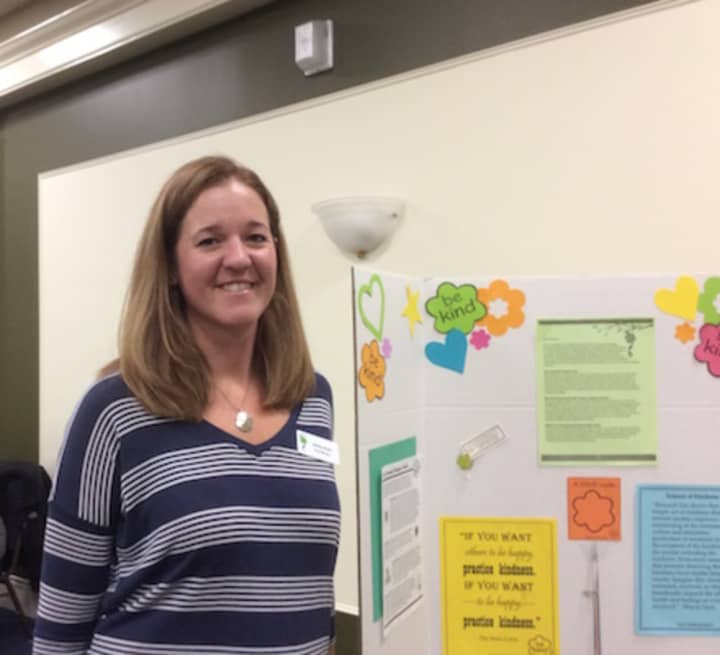Her lecture was called "Be Kind Now: It's Time to Get Serious About Kindness."
Maré shared how she came to be known as "the kindness lady" in Tucson, Ariz., after the sudden death of her 3-year-old son Ben. As she and her family waded through their grief, they realized that kindness was getting them through the tough times. Not just the kindness and support shown by family and friends, but also the little kindnesses strangers do for each other every day — holding a door or letting someone go ahead in traffic.
It did not remove the sadness they felt, but it helped lessen the suffering, she said.
"Stuff piled on top of sadness caused suffering," Maré said. "Kindness alleviates the stuff piled on top — the suffering — leaving just the sadness. Moments of kindness were keeping us going."
To honor Ben and to show gratitude for the kindness others had shown them, Maré and her family began making bells. They created the bells and secretly hung them in public places for people to find. It became a project — Ben's Bells — and from this, Ben's Bells, an organization devoted to kindness education, was born.
Ben's Bells is a familiar nonprofit in the region. After the mass shooting at Sandy Hook Elementary School in December 2012, the group opened an office in Bethel to aid in the healing after the deaths of 20 first-graders and six educators.
According to Maré, kindness isn't just about being nice. It is an intentional act that anyone can learn to practice — even people who weren't "born nice."
"We learned kindness is a skill," Maré said. "If you practice it, you get better at it."
She spoke about the science behind it, referring to the notion of the "kind mind." It goes beyond what has been referred to as the "reptile brain," which resides in the amygdala, a part of the brain that is reactive and focused on survival.
Instead, we need to use the higher functions of our brains to think, reason and choose.
“What is the kind thing to do is not always clear,” Maré said. “After Ben’s death, was it kinder to be with us or to give us our space?”
In that example, the answer was "both." At times, Maré or her family members needed to be with people, other times, they needed space.
To help illustrate what science has revealed about the human brain as it relates to kindness, Maré asked the audience to consider the following questions:
What are daily threats you face? Traffic? Being wrong?
What makes it hard for you to practice kindness?
Considering the answers to these questions leads you to metacognition — the ability to think about your thoughts, to think about your thinking, Maré said.
“Be the boss of your brain,” Maré said. As an example, she talked about a real-life experience. What do you do when your car breaks down? Do you get worked up about it, very upset, and does it ruin the rest of your day? Do you deal with it, find a work around, and move on?
The actual car breakdown doesn’t determine the rest of your day: “It’s how you react to it,” she said.
She suggested trying the metacognition bracelet exercise.
“Pick what you want to notice. Wear something on your wrist, and move the item to the other wrist each time you notice yourself doing whatever you picked,” she said. “You will become more aware. Then you can choose if you change your response. It gives you the power to make a different choice, to go through life making choices rather than only reacting.”
Other suggestions from Maré included noticing and acknowledging the positive things, keeping a gratitude journal, and writing kind notes. Being kind to oneself also made the list. “Treat yourself with the kindness you would show a very good friend,” she advised.
Another suggestion: get enough sleep.
“Two-thirds of the population are sleep deprived,” she said. “How are we supposed to be kind if we’re sleep deprived?"
Maré summed up the three steps to practicing kindness: self-awareness, empathy (determining what to do), and kindness (the doing it).
For more information on Ben's Bells and kindness education, click here.
Click here to follow Daily Voice Wilton and receive free news updates.





